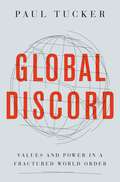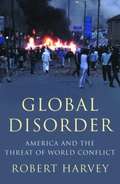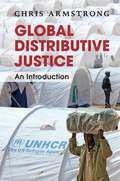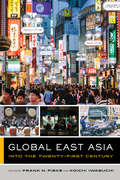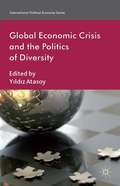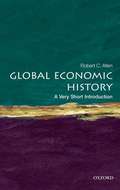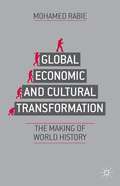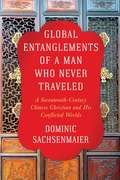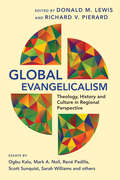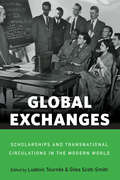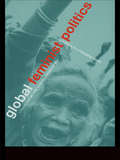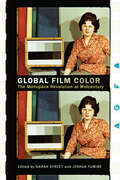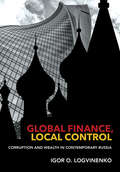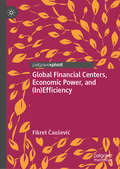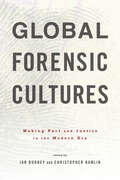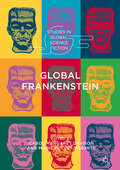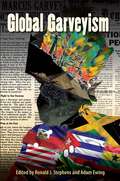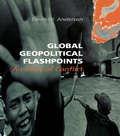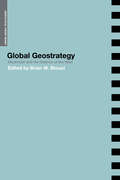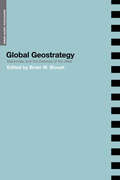- Table View
- List View
Global Discord: Values and Power in a Fractured World Order
by Paul TuckerHow to sustain an international system of cooperation in the midst of geopolitical struggleCan the international economic and legal system survive today’s fractured geopolitics? Democracies are facing a drawn-out contest with authoritarian states that is entangling much of public policy with global security issues. In Global Discord, Paul Tucker lays out principles for a sustainable system of international cooperation, showing how democracies can deal with China and other illiberal states without sacrificing their deepest political values. Drawing on three decades as a central banker and regulator, Tucker applies these principles to the international monetary order, including the role of the U.S. dollar, trade and investment regimes, and the financial system.Combining history, economics, and political and legal philosophy, Tucker offers a new account of international relations. Rejecting intellectual traditions that go back to Hobbes, Kant, and Grotius, and deploying instead ideas from David Hume, Bernard Williams, and modern mechanism-design economists, Tucker describes a new kind of political realism that emphasizes power and interests without sidelining morality. Incentives must be aligned with values if institutions are to endure. The connecting tissue for a system of international cooperation, he writes, should be legitimacy, creating a world of concentric circles in which we cooperate more with those with whom we share the most and whom we fear the least.
Global Disorder: America and the Threat of World Conflict
by Robert HarveyRecent financial history of the US
Global Distributive Justice
by Chris ArmstrongGlobal distributive justice is now part of mainstream political debate. It incorporates issues that are now a familiar feature of the political landscape, such as global poverty, trade justice, aid to the developing world and debt cancellation. This is the first textbook to focus exclusively on issues of distributive justice on the global scale. It gives clear and up-to-date accounts of the major theories of global justice and spells out their significance for a series of important political issues, including climate change, international trade, human rights and migration. These issues are brought to life through the use of case studies, which emphasise the connection of theories of justice to contemporary politics, and 'Further Issues' sections, which discuss emerging debates or controversies that are likely to command increasing attention in the coming years.
Global East Asia: Into the Twenty-First Century (The Global Square #4)
by Edited by Frank N. Pieke and Koichi IwabuchiHome to a rapidly rising superpower and the two largest economies in the world after the US, a global East Asia is seen and felt everywhere. This dynamic text views the global square from the perspective of the world’s most important rising global center. East Asia’s global impact is built on a dizzying combination: a strong and deep civilizational self-consciousness fused with hypermodernity, wealth, influence, and power, which have made the region a beacon for the world and an alternative to the West. Short, accessible essays by prominent experts on the region cover the core of East Asian—Japan, China, and Korea—as well as Mongolia and Taiwan. Topics include contemporary culture, artistic production, food, science, economic development, digital issues, education and research, and international collaboration. Students will glean new perspectives about the region using the insights of global studies.
Global Easts: Remembering, Imagining, Mobilizing (Asia Perspectives: History, Society, and Culture)
by Jie-Hyun LimSouth Korean historian Jie-Hyun Lim, raised under an anticommunist dictatorship, turned to Marxian thought to explain his country’s development, even as he came to struggle with its Eurocentrism. As a transnational scholar working in postcommunist Poland, Lim recognized striking similarities between Korean and Polish history and politics. One realization stood out: Both Korea and Poland—at once the “West” for Asia yet “Eastern” Europe—had been assigned the role of “East.”This book explores entangled Easts to reconsider global history from the margins. Examining the politics of history and memory, Lim reveals the affinities linking Eastern Europe and East Asia. He draws out commonalities in their experiences of modernity, in their transitions from dictatorship to democracy, and in the shaping of collective memory. Ranging across Poland, Germany, Israel, Japan, and Korea, Lim traces the global history of how notions of victimhood have become central to nationalism. He criticizes mass dictatorships of right and left in the Global Easts, considering Nazi jurist Carl Schmitt’s notion of sovereign dictatorship and the concept of decisionist democracy. Lim argues that nationalism is inherently transnational, critiquing how the nationalist imagination of the Global East has influenced countries across borders. Theoretically sophisticated and conceptually innovative, this book sheds new light on the transnational complexity of historical memory and imagination, the boundaries between democracy and mass dictatorship, and the fluidity of East and West.
Global Economic Crisis and the Politics of Diversity
by Yildiz AtasoyAn interdisciplinary group of scholars from the global North and South critically explore the global deepening of market economy models. In case studies including Asia, the Middle East and Latin America, they examine the associated tensions of livelihood and ecology in the current context of global economic crisis, considering issues of natural ecology, water use, health, childcare, technology and work, migration, and economic growth. The analysis of the complex connections between domestic and global dynamics across diverse cases and issues helps reveal that state-centric approaches are still hovering over the politics of restructuring through which conformity to economic growth is addressed.
Global Economic History: A Very Short Introduction (Very Short Introductions)
by Robert C. AllenWhy are some countries rich and others poor? In 1500, the income differences were small, but they have grown dramatically since Columbus reached America. Since then, the interplay between geography, globalization, technological change, and economic policy has determined the wealth and poverty of nations. The industrial revolution was Britain's path breaking response to the challenge of globalization. Western Europe and North America joined Britain to form a club of rich nations by pursuing four polices-creating a national market by abolishing internal tariffs and investing in transportation, erecting an external tariff to protect their fledgling industries from British competition, banks to stabilize the currency and mobilize domestic savings for investment, and mass education to prepare people for industrial work. Together these countries pioneered new technologies that have made them ever richer. Before the Industrial Revolution, most of the world's manufacturing was done in Asia, but industries from Casablanca to Canton were destroyed by western competition in the nineteenth century, and Asia was transformed into 'underdeveloped countries' specializing in agriculture. The spread of economic development has been slow since modern technology was invented to fit the needs of rich countries and is ill adapted to the economic and geographical conditions of poor countries. A few countries - Japan, Soviet Russia, South Korea, Taiwan, and perhaps China - have, nonetheless, caught up with the West through creative responses to the technological challenge and with Big Push industrialization that has achieved rapid growth through investment coordination. Whether other countries can emulate the success of East Asia is a challenge for the future. ABOUT THE SERIES: The Very Short Introductions series from Oxford University Press contains hundreds of titles in almost every subject area. These pocket-sized books are the perfect way to get ahead in a new subject quickly. Our expert authors combine facts, analysis, perspective, new ideas, and enthusiasm to make interesting and challenging topics highly readable.
Global Economic and Cultural Transformation
by Mohamed RabieSociety today faces multi-dimensional challenges that are hard to define and even harder to deal with. Social and economic systems throughout the world are becoming more complex and interdependent, and globalization is moving beyond the sphere of economics to engulf other aspects of life, particularly culture and security. Our current theories, strategies, and road maps are fast becoming out-dated and no new ones have emerged to take their place. Mohamed Rabie re-examines the relevance of major ideas and systems of the recent past, including ideology and its relation to society in Global Economic and Cultural Transformation. This book is an attempt defines and explains this transitional period and provides a new conception of economic and societal world history, which us understand how we got here and where we are going.
Global Entanglements of a Man Who Never Traveled: A Seventeenth-Century Chinese Christian and His Conflicted Worlds (Columbia Studies in International and Global History)
by Dominic SachsenmaierBorn into a low-level literati family in the port city of Ningbo, the seventeenth-century Chinese Christian convert Zhu Zongyuan likely never left his home province. Yet Zhu nonetheless led a remarkably globally connected life. His relations with the outside world, ranging from scholarly activities to involvement with globalizing Catholicism, put him in contact with a complex and contradictory set of foreign and domestic forces. In Global Entanglements of a Man Who Never Traveled, Dominic Sachsenmaier explores the mid-seventeenth-century world and the worldwide flows of ideas through the lens of Zhu‘s life, combining the local, regional, and global. Taking particular aspects of Zhu‘s multiple belongings as a starting point, Sachsenmaier analyzes the contexts that framed his worlds as he balanced a local life and his border-crossing faith. At the local level, the book pays attention to the intellectual, political, and social environments of late Ming and early Qing society, including Confucian learning and the Manchu conquest, questioning the role of ethnic and religious identities. At the global level, it considers how individuals like Zhu were situated within the history of organizations and power structures such as the Catholic Church and early modern empires amid larger transformations and encounters. A strikingly original work, this book is a major contribution to East Asian, transnational, and global history, with important implications for historical approaches and methodologies.
Global Evangelicalism: Theology, History & Culture in Regional Perspective
by Richard V. Pierard Donald M. LewisGlobal Evangelicalism
Global Exchanges: Scholarships and Transnational Circulations in the Modern World
by Giles Scott-Smith Ludovic TournèsExchanges between different cultures and institutions of learning have taken place for centuries, but it was only in the twentieth century that such efforts evolved into formal programs that received focused attention from nation-states, empires and international organizations. Global Exchanges provides a wide-ranging overview of this underresearched topic, examining the scope, scale and evolution of organized exchanges around the globe through the twentieth century. In doing so it dramatically reveals the true extent of organized exchange and its essential contribution for knowledge transfer, cultural interchange, and the formation of global networks so often taken for granted today.
Global Families: A History of Asian International Adoption in America (Nation of Nations #8)
by Catherine Ceniza ChoyIn the last fifty years, transnational adoption—specifically, the adoption of Asian children—has exploded in popularity as an alternative path to family making. Despite the cultural acceptance of this practice, surprisingly little attention has been paid to the factors that allowed Asian international adoption to flourish. In Global Families, Catherine Ceniza Choy unearths the little-known historical origins of Asian international adoption in the United States. Beginning with the post-World War II presence of the U.S. military in Asia, she reveals how mixed-race children born of Japanese, Korean, and Vietnamese women and U.S. servicemen comprised one of the earliest groups of adoptive children. Based on extensive archival research, Global Families moves beyond one-dimensional portrayals of Asian international adoption as either a progressive form of U.S. multiculturalism or as an exploitative form of cultural and economic imperialism. Rather, Choy acknowledges the complexity of the phenomenon, illuminating both its radical possibilities of a world united across national, cultural, and racial divides through family formation and its strong potential for reinforcing the very racial and cultural hierarchies it sought to challenge.
Global Feminist Politics: Identities in a Changing World
by Suki Ali Kelly Coate Wangui Wa GoroGlobal Feminist Politics examines the changing global context for feminist political action, its meaning and forms. It acknowledges the existence of dissent and debate among feminists, asserting that such debate leads to innovation in theory and practice. This book reaches the conclusion that the future of the women's movement depends upon a dialogue which is unafraid to cut across perceived differences.Focusing on key issues raise by a feministic commitment to global political change, this book covers subjects including:* the relevance of contemporary feminist politics for younger women* gendered accounts of genocide and catastrophe* exile, migration and diaspora* gender and the internet* women and the nationalist movement in India* gender issues in Pakistan, Australia, South Africa and the Middle East.Featuring an international panel of cutting-edge feminist thinkers, Global Feminist Politics demonstrates the innovative work being undertaken in the academic and professional worlds, as well as in women's activism. It is an invaluable resource for students in Women's Studies and Development Studies, as well as all those interested in the development of contemporary global feminism.
Global Film Color: The Monopack Revolution at Midcentury
by William Carroll Joshua Yumibe Philip Cavendish Kathryn Millard Sarah Street Laura Major Ranjani Mazumdar Stefan Soloman Kirsty Sinclair Dootson Kamalika Sanyal Heather Heckman Lydia Pappas Elena Gipponi Rafael de Luna Freire Josephine Diecke Linda Chen ZhangGlobal Film Color: The Monopack Revolution at Midcentury explores color filmmaking in a variety of countries and regions including India, China, Japan, and Russia, and across Europe and Africa. Most previous accounts of color film have concentrated on early 20th century color processes and Technicolor. Far less is known about the introduction and application of color technologies in the period from the mid-1940s to the 1980s, when photochemical, “monopack” color stocks came to dominate global film markets. As Eastmancolor, Agfacolor, Fujicolor and other film stocks became broadly available and affordable, national film industries increasingly converted to color, transforming the look and feel of global cinema. Covering a broad range of perspectives, the chapters explore themes such as transnational flows, knowledge exchange and transfer, the cyclical and asymmetrical circulation of technology in a global context, as well as the accompanying transformation of color film aesthetics in the postwar decades.
Global Finance, Local Control: Corruption and Wealth in Contemporary Russia (Cornell Studies in Money)
by Igor O. LogvinenkoExploring Russia's reentry into global capital markets at the dawn of the twenty-first century, Global Finance, Local Control shows how economic integration became deeply entangled with a bare-knuckled struggle for control over the vestiges of the Soviet empire. Igor Logvinenko reveals how the post-communist Russian economy became a full-fledged participant in the international financial sector without significantly improving the local rule of law.By the end of Vladimir Putin's second presidential term, Russia was more integrated into the global financial system than at any point in the past. However, the country's longstanding deficiencies—including widespread corruption, administration of justice, and an increasingly overbearing state—continued unabated. Scrutinizing stock-market restrictions on foreign ownership during the first fifteen years of Russia's economic transition, Logvinenko concludes that financial internationalization allowed local elites to raise capital from foreign investors while maintaining control over local assets. They legitimized their wealth using Western institutions, but they did so on their terms.Global Finance, Local Control delivers a somber lesson about the integration of emerging markets: without strong domestic rule-of-law protections, financial internationalization entrenches oligarchic capitalism and strengthens authoritarian regimes.
Global Financial Centers, Economic Power, and (In)Efficiency
by Fikret ČauševićThis book scrutinizes global financial flows and stocks, both financial assets and liabilities and their impact on the global balance of economic power, especially as they affect the largest and fastest-growing countries in both the developed and the developing world. It shows how financial flows can promote economic growth and financial capital can serve as a tool for higher growth rates in emerging market economies, but also that the huge amounts of financial capital currently being spent in advanced countries to promote economic growth has produced at best very modest improvements and in some cases negative results.The book opens with an analysis of global capital flows and their concentration. It then offers an analysis of rates of relative economic growth (or decline). The final section deals with the (decreasing) economic efficiency of financial flows and the (un)sustainability of economic growth, especially during the past eight years of economic recovery. Tackling one of the most serious problems in the global economy today, this book will be of interest to academics, researchers, and students of capital markets, financial crisis, and financial economics.
Global Financial Contagion
by Shalendra D. SharmaThis book is an authoritative account of the economic and political roots of the 2008 financial crisis. It examines why it was triggered in the United States, why it morphed into the Great Recession, and why the contagion spread with such ferocity around the globe. It also examines how and why economies - including the Eurozone, Russia, China, India, East Asia, and the Middle East - have been impacted and explores their response to the unprecedented challenges of the crisis and the effectiveness of their policy measures. Global Financial Contagion specifically looks at how the Obama administration's policy missteps have contributed to America's huge debt and slow recovery, why the Eurozone's response to its existential crisis has become a never-ending saga, and why the G-20's efforts to create a new international financial architecture may fall short. This book will long be regarded as the standard account of the crisis and its aftermath.
Global Financial Crisis: The Ethical Issues
by Ned DobosThe Global Financial Crisis is acknowledged to be the most severe economic downturn since the 1930s, and one that is unique in its underlying causes, its scope, and its wider social, political and economic implications. This volume explores some of the ethical issues that it has raised.
Global Financial Integration Thirty Years On
by Geoffrey R. D. Underhill Jasper Blom Daniel MüggeA policy-relevant overview of the issues and problems involved in devising an effective global financial system for the future.
Global Forensic Cultures: Making Fact and Justice in the Modern Era
by Ian Burney and Christopher HamlinEssays explore forensic science in global and historical context, opening a critical window onto contemporary debates about the universal validity of present-day genomic forensic practices.Contemporary forensic science has achieved unprecedented visibility as a compelling example of applied expertise. But the common public view—that we are living in an era of forensic deliverance, one exemplified by DNA typing—has masked the reality: that forensic science has always been unique, problematic, and contested. Global Forensic Cultures aims to rectify this problem by recognizing the universality of forensic questions and the variety of practices and institutions constructed to answer them.Groundbreaking essays written by leaders in the field address the complex and contentious histories of forensic techniques. Contributors also examine the co-evolution of these techniques with the professions creating and using them, with the systems of governance and jurisprudence in which they are used, and with the socioeconomic, political, racial, and gendered settings of that use. Exploring the profound effect of "location" (temporal and spatial) on the production and enactment of forms of forensic knowledge during the century before CSI became a household acronym, the book explores numerous related topics, including the notion of burden of proof, changing roles of experts and witnesses, the development and dissemination of forensic techniques and skills, the financial and practical constraints facing investigators, and cultures of forensics and of criminality within and against which forensic practitioners operate.Covering sites of modern and historic forensic innovation in the United States, Europe, and farther-flung imperial and global settings, these essays tell stories of blood, poison, corpses; tracking persons and attesting documents; truth-making, egregious racism, and sinister surveillance. Each chapter is a finely grained case study. Collectively, Global Forensic Cultures supplies a historical foundation for the critical appraisal of contemporary forensic institutions which has begun in the wake of DNA-based exonerations.Contributors: Bruno Bertherat, José Ramón Bertomeu Sánchez, Binyamin Blum, Ian Burney, Marcus B. Carrier, Simon A. Cole, Christopher Hamlin, Jeffrey Jentzen, Projit Bihari Mukharji, Quentin (Trais) Pearson, Mitra Sharafi, Gagan Preet Singh, Heather Wolffram
Global Frankenstein (Studies in Global Science Fiction)
by Marie Mulvey-Roberts Carol Margaret DavisonConsisting of sixteen original essays by experts in the field, including leading and lesser-known international scholars, Global Frankenstein considers the tremendous adaptability and rich afterlives of Mary Shelley’s iconic novel, Frankenstein, at its bicentenary, in such fields and disciplines as digital technology, film, theatre, dance, medicine, book illustration, science fiction, comic books, science, and performance art. This ground-breaking, celebratory volume, edited by two established Gothic Studies scholars, reassesses Frankenstein’s global impact for the twenty-first century across a myriad of cultures and nations, from Japan, Mexico, and Turkey, to Britain, Iraq, Europe, and North America. Offering compelling critical dissections of reincarnations of Frankenstein, a generically hybrid novel described by its early reviewers as a “bold,” “bizarre,” and “impious” production by a writer “with no common powers of mind”, this collection interrogates its sustained relevance over two centuries during which it has engaged with such issues as mortality, global capitalism, gender, race, embodiment, neoliberalism, disability, technology, and the role of science.
Global Garveyism
by Adam Ewing Ronald J. StephensIlluminating the global impact of Marcus Garvey's Black nationalist philosophy Arguing that the accomplishments of Jamaican activist Marcus Garvey and his followers have been marginalized in narratives of the Black freedom struggle, this volume builds on decades of overlooked research to reveal the profound impact of Garvey’s post–World War I Black nationalist philosophy around the globe and across the twentieth century. These essays point to the breadth of Garveyism’s spread and its reception in communities across the African diaspora, examining the influence of Garvey’s Universal Negro Improvement Association (UNIA) in Africa, Australia, North America, and the Caribbean. They highlight the underrecognized work of many Garveyite women and show how the UNIA played a key role in shaping labor unions, political organizations, churches, and schools. In addition, contributors describe the importance of grassroots efforts for expanding the global movement—the UNIA trained leaders to organize local centers of power, whose political activism outside the movement helped Garvey’s message escape its organizational bounds during the 1920s. They trace the imprint of the movement on long-term developments such as decolonization in Africa and the Caribbean, the pan-Aboriginal fight for land rights in Australia, the civil rights and Black Power movements in the United States, and the radical pan-African movement. Rejecting the idea that Garveyism was a brief and misguided phenomenon, this volume exposes its scope, significance, and endurance. Together, contributors assert that Garvey initiated the most important mass movement in the history of the African diaspora, and they urge readers to rethink the emergence of modern Black politics with Garveyism at the center. Contributors: Ronald J. Stephens | Adam Ewing | Keisha N. Blain | Nicole Bourbonnais | José Andrés Fernández Montes de Oca | John Maynard | Erik S. McDuffie | Frances Peace Sullivan | Robert Trent Vinson | Michael O. West
Global Geopolitical Flashpoints: An Atlas of Conflict
by Ewan W. AndersonThis resource describes more than 120 major flashpoints--current and potential conflicts from around the world. The work analyzes each situation, its issues, and present status, and includes specially commissioned maps and extensive bibliographies to aid understanding. Also includes 125 maps.
Global Geostrategy: Mackinder and the Defence of the West
by Brian W. BlouetThis is a new examination of Halford Mackinder’s seminal global geostrategic work, from the perspective of geography, diplomatic history, political science, international relations, imperial history, and the space age.Mackinder was a man ahead of his time. He foresaw many of the key strategic issues that came to dominate the twentieth century. Until the disintegration of the Soviet Union, western defence strategists feared that one power, or alliance, might come to dominate Eurasia. Admiral Mahan discussed this issue in The Problem of Asia (1900) but Mackinder made the most authoritative statement in "The Geographical Pivot of History" (1904). He argued that in the "closed Heart-Land of Euroasia" was a strategically placed region, with great resources, that if controlled by one force could be the basis of a World Empire. James Kurth, in Foreign Affairs, has commented that it has taken two World Wars and the Cold War to prevent Mackinder’s prophecy becoming reality. In World War I and World War II Germany achieved huge territorial gains at the expense of the Russian empire and the Soviet Union. In the former conflict the Russian empire was defeated by Germany but the western powers insisted that the territorial gains made by Germany, at the treaty of Brest-Litovsk, be given up. In World War II Britain and the US gave material support to Stalin’s totalitarian regime to prevent Nazi Germany gaining control of the territory and resources that might have been a basis for world domination. The west, highly conscious of Mackinder’s dictum (1919) that "Who rules East Europe commands the Heartland," quickly adopted policies to contain the Soviet Union. History has therefore proved Mackinder’s work to be of vital importance to generations of strategic thinking and he remains a key influence in the new millennium.This book will be of great interest to all students and scholars of strategic studies and military history and of geopolitics in particular.
Global Geostrategy: Mackinder and the Defence of the West (Geopolitical Theory)
by Brian W. BlouetThis is a new examination of Halford Mackinder’s seminal global geostrategic work, from the perspective of geography, diplomatic history, political science, international relations, imperial history, and the space age. Mackinder was a man ahead of his time. He foresaw many of the key strategic issues that came to dominate the twentieth century. Until the disintegration of the Soviet Union, western defence strategists feared that one power, or alliance, might come to dominate Eurasia. Admiral Mahan discussed this issue in The Problem of Asia (1900) but Mackinder made the most authoritative statement in "The Geographical Pivot of History" (1904). He argued that in the "closed Heart-Land of Euroasia" was a strategically placed region, with great resources, that if controlled by one force could be the basis of a World Empire. James Kurth, in Foreign Affairs, has commented that it has taken two World Wars and the Cold War to prevent Mackinder’s prophecy becoming reality. In World War I and World War II Germany achieved huge territorial gains at the expense of the Russian empire and the Soviet Union. In the former conflict the Russian empire was defeated by Germany but the western powers insisted that the territorial gains made by Germany, at the treaty of Brest-Litovsk, be given up. In World War II Britain and the US gave material support to Stalin’s totalitarian regime to prevent Nazi Germany gaining control of the territory and resources that might have been a basis for world domination. The west, highly conscious of Mackinder’s dictum (1919) that "Who rules East Europe commands the Heartland," quickly adopted policies to contain the Soviet Union. History has therefore proved Mackinder’s work to be of vital importance to generations of strategic thinking and he remains a key influence in the new millennium. This book will be of great interest to all students and scholars of strategic studies and military history and of geopolitics in particular.
